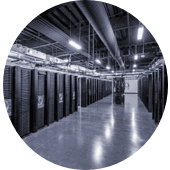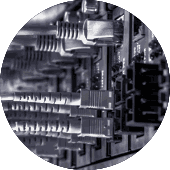What is a Bare Metal Server?
The term "bare metal server" is used to describe a dedicated hosting service where a physical dedicated server is provided to the user. By definition, bare metal servers are dedicated servers - single-tenant infrastructure environments.
With bare metal server hosting, a user's resources, such as the processor, memory, and data storage arrays, are not shared with other users. The server has its own dedicated internet bandwidth through a copper or fiber network port, as well as its own IPv4 and IPv6 addresses.
Bare metal server users can install an operating system (OS) directly on the physical server or use a hypervisor and computer virtualization technology.
Bare metal servers are a highly secure and private technology environment because they are physically isolated from the complex IT infrastructure architectures that are built, deployed, and maintained to deliver cloud infrastructure services to multiple tenants.
When an organization uses a bare metal server, the provider has no direct access to or control over the server. The configured and hosted applications and data are considered the private property of the user for as long as they have an active subscription. Bare metal servers can be used on a long-term contract (1 year or more) or on a month-to-month, pay-as-you-go basis.
Can I scale the CPU, RAM and storage of the Bare Metal Server?
The processing power (CPU power), Random-access memory (RAM), and storage capacity used by the IT environment and applications configured on the bare metal server can be scaled up to the physical limits of the physical processor, RAM, and storage drive capacity of the selected hardware configuration.
Depending on the selected physical server hardware system, the RAM can be upgraded to the maximum amount supported by the server motherboard. For some dedicated servers, storage drives (HDD, SATA, SAS, SSD, or NMVe) can be upgraded without powering down the physical machine.
What is the security level of my Bare Metal Server?
Providers of Bare Metal Servers and Dedicated Cloud Hosting infrastructure providers offer the following levels of security with their dedicated hosting services:
1. Physical Environment Security
Physical environment security refers to all physical aspects of the data center facility used to house bare metal servers. This includes the resilience against natural disasters, the physical design of the data center and the way the server rooms and cabinets are organized, as well as power redundancy, Internet network redundancy, and overall business continuity.
2. Network Security
Network security is part of the overall data center communications architecture. It includes the redundancy of fiber connectivity routes and the wide choice of ISPs and interconnection options.
3. Bare Metal Server Security
This can also be referred to as "Bare Metal Server Security". It refers to the specific hardware components and configurations of the server that increase its operational availability. These include the number of power supplies (PSUs) used, the number and capacity of network interface cards (NICs), the number and specification of hard drives used (SATA, SAS, SSD, NMVe, etc.), the use of RAID controllers, the Intelligent Platform Management Interface (IPMI), also called ILO and iDrac by server vendors) for remote network access to the server, etc.
As a provider of bare metal servers, HC automatically covers the highest possible industry standards regarding "Physical Environment Security" and "Network Security". The "Physical Server Security" is a customizable element of the dedicated hosting server, which is a choice of the user of the physical server (i.e. the customer).
Most of our dedicated servers include the following "Physical Server Security" by default:
- Redundant Power Supplies (PSUs)
- At least 2 x 1 Gbps physical Network Interface Cards (NICs)
- Intelligent Platform Management Interface (IPMI) and IPMI capabilities, except for the Edge servers, which are shipped with SSH management access only and are not recoverable in the event of an operating system (OS) failure that renders the server inoperable
Do HC's Bare Metal servers come with a firewall?
The type of firewall depends on the operating system used on your bare metal server. If your server uses a Linux operating system, one of the most popular firewall choices is Iptables.
Iptables is a user-space utility in Linux used to configure and manage the Netfilter firewall. Netfilter itself is a packet filter and firewall implemented in the standard Linux kernel. It allows administrators to control network traffic by defining rules for filtering, translating, and altering packets.
Other popular software firewall choices include Firewalld, IPFire, OPNsense, and pfSense, as well as underlying tools such as Iptables, Nftables, and UFW. IPFire, OPNsense, and pfSense are open-source firewall distributions.
Firewalld is a firewall management tool used by Red Hat Linux operating systems, including AlmaLinux and Rocky Linux. It provides firewall features by acting as a front end for the Linux kernel's Netfilter framework. The current default backend for Firewalld is Nftables.
If your server is installed with Ubuntu OS, you can use UFW firewall. One of the UFW's benefits is that it offers a command-line interface and a graphical interface (Gufw) that are much easier to understand and use than directly interacting with Iptables.
The Windows Defender Firewall is the most popular firewall for the Microsoft Windows operating system. Other widely used software firewalls for the Windows OS include ZoneAlarm Free Firewall, GlassWire, TinyWall, and Comodo Firewall. Many other software firewalls are also sold under commercial licenses on a Software-as-a-Service (SaaS) basis.
Are there any Bare Metal Servers with Unlimited Bandwidth?
Yes, but since nothing tangible is unlimited, we need to specify what we mean by "unlimited bandwidth". If by "Bare Metal Server with unlimited bandwidth", we mean a server with no preset limit quota for the transmitted incoming and outgoing Internet traffic and without charges for overage data transfers, then HostColor offers dedicated servers with unlimited bandwidth up to the size of the physical network connection.
There are two models of delivering network services and internet traffic on the cloud and bare metal servers - one measured by the allocated "Bandwidth" quota (in Mbps or Gbps), the other measured by the transmitted "Data Transfer" (in megabytes or terabytes).
"Bandwidth" describes the overall data volume (in Mbps or Gbps) that can be transferred usually in a period of 30 days. "Bandwidth" is also a term used to describe the size of the internet connection port - for example, 1 Gbps, 10 Gbps, 20 Gbps, etc.
"Data Transfer" is the monthly amount of data in terabytes (TB), allowed to be transferred over your internet port.
What does Unmetered Bandwidth mean?
"Unmetered Bandwidth" or "bare metal server with unmetered bandwidth" means that the hosting infrastructure provider does not measure or limit the bandwidth used by the server. For example, in most of its Edge data centers, HostColor allows its customers to use the full capacity of the physical Internet bandwidth port of their bare metal dedicated servers.
Is my Bare Metal Server protected against DDoS attacks?
Denial of Service (DoS) and Distributed Denial of Service (DDoS) attacks typically result in service unavailability and thousands of dollars in data transfer service fees, especially if you host your IT infrastructure with one of the major hyperscale cloud providers.
HostColor's DDoS-protected bare metal servers minimize the risk of service unavailability and virtually eliminate the risk of you incurring data transfer costs as a result of artificial, bot-generated traffic to your server instances.
When you use our bare metal hosting services, your applications run behind sophisticated DDoS protection firewalls, maximizing application availability. Our natural, enterprise-grade DDoS networks naturally protect your IT infrastructure from unexpected network downtime, protecting your business from loss and revenue. Our DDoS-protected network services filter out malicious traffic, ensuring that legitimate requests reach your servers and applications. Specifically, our DDoS protection includes the following capabilities:
- Real-time mitigation of malicious attacks
- Human-generated traffic that reaches your bare metal servers
- Native protection against network attacks of any size
- No additional fees or charges for DoS and DDoS protected bare metal servers
- No fees for bot-generated and malicious traffic on all unmetered bare-metal dedicated servers
- No increased latency and long round-trip delays in application delivery in the event of a network attack
- All IPv4 and IPv6 settings are protected from DDoS attacks
Is my Edge Bare Metal Server protected against failure?
Yes! Each Bare Metal server hosted in our
Edge data centers has four (4x) 25-gigabit network interfaces configured for redundancy on 2 separate NIC cards. All four interfaces are placed into a single link access group (LAG) and utilize LACP (Link Aggregation Control Protocol ) for individual link monitoring. Your Bare Metal Server is connected to two network switches with two (2x) 25-gigabit connection links to the first switch and two (2x) 25-gigabit to the second switch. Each network switch has multiple 100-gigabit fiber connections to the data center's network architecture that feature failover protection. The overall networking architecture sustains full data transfer capacity with the failure of any single networking appliance or link. The data transfer from the Edge data centers to either the public Internet or the MPLS IP VPN network is secured by two diverse routers for each network. The routers are connected to a pair of network switches. The data transfer can be forwarded through both routers and will switch over automatically upon failure of any networking device.
Does HC offer Bare Metal Servers with AMD CPU?
Yes, go to our
AMD Dedicated Servers to find hardware configurations with various AMD Ryzen and AMD Epyc processors. When you click to order one of the AMD CPU-based bare metal server plans, you can select the service location and fully customize the server starting with the edge location, RAM, memory type and capacity, bandwidth port, and data transfer quota. .
Is there technical support available for my Bare Metal Server?
All HostColor bare-metal servers come with free infrastructure support. We save your money. Unlike major cloud infrastructure providers who charge clients for technical support on unmanaged infrastructure, HostColor never charges you for such support. Our infrastructure technical support includes everything related to network interfaces and the core functionality of the physical components of your server such as CPU, RAM, and storage drives. However, it does not include support for the operating system, any custom configurations created and managed by the client, and the installed software applications. With our free infrastructure support, you can save money and get the technical assistance you need for your server's core components.
How to protect my hosted apps and data from natural disasters?
To protect your hosted applications and data from any type of natural disaster, your organization must have two different bare metal servers hosted in two different data centers. The distance between the two datacenter locations must be at least 100 miles (100 km). When selecting dedicated server locations, it is important to consider the risk of natural disasters for each geographic region.
Once two or more bare metal servers are in place in two different data centers, the servers must be interconnected and the applications and data must be either backed up or mirrored. In the event of failure of the primary bare metal server, operations are switched to the redundant server according to a specific readiness level scenario and procedure. The latter depends on the chosen disaster recovery and business continuity model.
Can I use Bare Metal Servers for disaster recovery purposes?
Yes, Disaster Recovery (DR), refers to the ability to preserve applications and data and resume technology operations after an interruption caused by an outage, data loss, or failure of the main IT infrastructure (either a bare metal server or a virtual infrastructure environment).
Bare Metal Serverя are a convenient way to create and implement a fully customizable and private disaster recovery infrastructure. The leased physical (bare metal) servers have a major advantage over the virtual environments hosted in one of the large hyperscale clouds. The disaster recovery infrastructure deployed on bare metal servers is managed and governed solely by the organization's internal data retention policies and procedures. This makes the DR infrastructure deployed on physical servers a private technology asset that is 100% controlled by its owner.
Can Bare Metal Servers be used for Business Continuity?
Yes, any organization can use two or more bare metal dedicated servers (also known as bare metal servers) to deploy a customized Business Continuity scenario. The term "Business Continuity" describes an active, fully operational bare metal cloud hosting infrastructure model that enables an organization to maintain its technology operations and workflow with virtually no interruption in the event of a failure or outage of its primary technology infrastructure.








